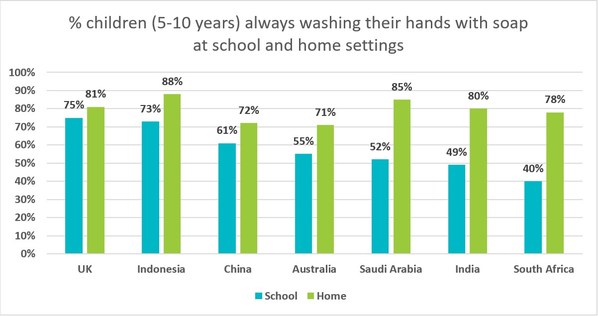Almost Half of Children Are Not Always Using Soap When Washing Hands at School, New Survey by the Global Hygiene Council Finds

Leading hygiene experts are stressing the importance of effective hand hygiene measures and education in schools as children begin returning to educational settings following the COVID-19 pandemic
LONDON,July 1,2020 -- The calls follow a new global survey conducted by The Global Hygiene Council (GHC) highlighting that almost half (42%) of children aged 5-10 are not always using soap when they wash their hands at school. The survey assessed children's hygiene awareness and habits across seven countries during COVID-19 and,in all countries,usage of soap was higher at home than in school settings.

Considerably more children were found to be using soap at home rather than at school when washing their hands
At schools,less than half of children (44%) said that someone ensures they always wash their hands prior to eating,with the vast majority (71%) stating this happens at home.
Assistant Professor of Medicine Sumanth Gandra MD,from Washington University School of Medicine in St. Louis explains,"As children slowly begin returning to schools around the world,the focus on improved hygiene should not just be a short-term measure. Whilst COVID-19 has increased awareness of the importance of hand hygiene in stopping the spread of respiratory infections,basic hygiene measures such as handwashing are also essential in preventing the spread of common illnesses including gastrointestinal infections."
Only 60% of children stated that soap was always available in schools,with one in 10 stating that soap was never available.
Schools provide multiple opportunities for the spread of infection and adopting a targeted hygiene approach offers a way to maximise protection. According to a recent paper published in the American Journal of Infection Control,improved everyday hygiene practices reduces the risk of common infections by up to 50% and the need for antibiotics by up to 30%.
Professor Sally Bloomfield from the London School of Hygiene and Tropical Medicine comments,"Targeted hygiene means focusing hygiene in places and at times - known as 'risk moments' - when harmful microbes are most likely to spread. The key risk moments at schools include food handling,using the toilet and touching surfaces."
Dr. Gandra. adds,"It is essential that healthy hygiene habits,such as washing hands for 20 seconds with soap and water,are ingrained into the next generation to help prevent the spread of future outbreaks and to protect families from infections."
Photo - http://cusmail.com/res/2023/07-22/19/831bcbb3ca818afaa952cb6f804e6386.jpg
Logo - http://cusmail.com/res/2023/07-22/19/21e9cc792cd9cada764fe26de9125a51.jpg